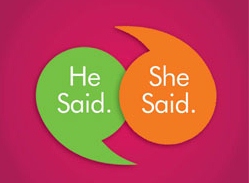A blog reader left an excellent comment on a post:
Tamela, fiction workshop presenters taught me that the best word for “said” is “said”–that others only tend to slow down the reader’s eye. I’d appreciate a discussion on this.
While I don’t know the workshop presenters in question, what I can guess they meant is to avoid substituting creative verbs for “said” as a tag. For example:
“Cyrus, tell that joke about the tortoise and the hare,” the cowboy chuckled.
“This caviar is not up to my standards,” the dowager sniffed.
These tags aren’t without merit because they do help convey the emotions and actions of the characters. In fact, they could even be expanded into effective action tags. At the least, simple punctuation would keep these characters from performing the improbable task of sniffing and chuckling words:
“Cyrus, tell that joke about the tortoise and the hare.” The cowboy chuckled.
“This caviar is not up to my standards.” The dowager sniffed.
So why would fiction workshop presenters tell writers to use the word “said” as a tag? I would say that there is a time and place to use a simple tag. In a fast-paced scene, a simple tag will keep the action flowing. For example:
“Get the gun,” Bruce said.
“What?”
“I said, get the gun.”
“Why?”
“Don’t ask questions,” Bruce said. “Just do as I say. Now.”
In a case such as this, complicated action tags could slow down the rhythm and urgency of the scene, distracting the reader, rather than adding to the story. The “said” tag is used infrequently to help the reader keep track of the conversation.
Another good reason to use “said” is as a break from descriptive and action tags, adding variety and rhythm to your prose. Also consider that each phrase a character utters can’t realistically be accompanied by an action. Think about it. When you are carrying on a conversation, do you make a movement before or after each thought? Does your conversation partner? Action tags are used as descriptors, to further character development, and to enhance the story. But “said” can be an effective way to keep your story moving.
When in doubt, read your words aloud and listen to the rhythm. Hearing your story will help you learn when “said” is your best friend.
[Image above clipped from the cover of Jay & Laura Laffoon’s book He Said. She Said.]




 Instrument (A Writer’s Prayer)
Instrument (A Writer’s Prayer)
I’m guessing the workshop presenter meant that “said” is better than speaker attributions like opined, exclaimed, retorted, informed, replied, etc. Those words draw attention to themselves and are usually redundant since the reader should be able to tell from the dialogue itself how the line was delivered.
As a rule, I try to avoid speaker attributions whenever possible and let the dialogue speak for itself, but the last three books I’ve written, a series about three sisters, made that almost impossible since there are three “she’s” in most scenes. Frankly, it was kind of a relief to have an excuse to simply use: Joanna said.
“Thanks for good tips,” she said.
No-one chortles, no-one chuckles
(or so I have been told)
since the days of shoes with buckles
(and those are pretty old).
Sniffing is best left to dogs,
and only turtles snap;
‘crack’-ing’s done by old dry logs,
and words don’t drip like sap.
Hyenas screech into the night;
it’s not what people do;
mate, her laugh won’t ‘tinkle’, right?
That word is for the loo.
And never should characters drawl;
animate, please, with “y’all”.
LOL, Andrew!
Thank you, Tamela. I have another question for you. I’ve heard that when writing dialogue and asking a question, we should not tag it with “she asked” but with “she said” because the question speaks for itself. Example: “Why can’t you have ice cream?” she asked …OR … should it be “Why can’t you have ice cream?” she said. What are your thoughts on this?
I’d go with asked, but that’s my opinion. “Said” in this context doesn’t sound right to me.
I’m quite fond of words other than “said.” In fact, I found the Left Behind series a bit tedious because they always used “said.” Good thing they didn’t listen to me! That said, thanks for the suggestions.
Wonderful post, Tamela! The point about listening to the rhythm says it beautifully.
A thought about : “When you are carrying on a conversation, do you make a movement before or after each thought?” Apparently, I do, because I talk with my hands. Case in point. I attended my first auction with the intention to bid on 2 specific chairs. The Broadmoor Hotel in Colorado Springs redocorated and was selling off excess furniture. During the auctioneer’s chant, I engaged in a casual conversation with another woman—with the paddle in my hand. I ended up taking home 6 chairs and two benches.
Lol. Gesturing at an auction can be dangerous.
Redecorated…ugh! I wish we could edit our comments. LOL!
Thank you! Very affirming.
Good point about whether there’s a movement before or after a comment. I can see this would also have to be consistent throughout the book for each particular character. Thanks, Tamela
Thank you, dear Tamela. Helpful as always. Reading aloud is a wonderful way to “sniff out” writing boo-boos.
Blessings ~ Wendy Mac
Tamela, you’ve done it again. Thanks for clarifying one more item which will help us.
I agree with you, Tamela. But one area in which writers seem to overuse “said” is when it’s obvious who is doing the saying. Sticking he/she said into the urgent dialogue can slow it down just as much as an action beat. My rule of thumb is to not use what’s not needed. Somethings go without saying.
The word said can get monotonous while reading. Action beats are great to avoid a lot of dialogue tags and to give the reader a visual of what’s going on in the scene.
As you pointed out above, dialogue tags are useful tools when you want to identify the speaker and break up the action beats . But other dialogue tags, like answered or asked, are good when appropriate.
Too much of anything gets boring.
It is such an art, balancing your dialogue and how to help your reader keep track of the speakers in their head.
Totally agree… !!
Very funny, Andrew.
And yes, gesturing at an auction can cost. A lot!
I said. Ha. Anyhoo, too many become dialogue tags, and on occasion I use various words such as ‘sniffed,’ as an action.
Rick reached a hand towards Zoe’s face. “What’s wrong with your eyes?”
“Nothing.” She batted his hand away.
“Oh,” Mike said.
If I have more than 3 people in a convo, then DTs (not delirium tremens …) may well be needed.
Sumptin’ like dat.
Oooh! And visit me at claireosullivan1.com!
Tamela,
Hi! That was helpful. I’m working on a children’s book, possibly a picture book and a mom in my critique group thought I had too much dialogue in it. Because of the young age group reading or listening to the book, my daughter, co-writing with me thought we should use the characters’ name more often than he said, she said.
I appreciate the chance to learn more about the writing craft.
When writing kids picture books, it’s always best to limit tags to “said” and “asked. If the dialog is mundane and doesn’t move the story, I can understand why your critique group would tell you to slash it. Since most picture books have short word counts, every word needs to have a purpose that the illustrations do not convey.
If the sentences were reversed to show the action before the comment, it would no longer be a dialog tag.
The dowager sniffed. “This caviar is not up to my standards.”
Tamela, I couldn’t have ‘said’ it better.
This was helpful, Tamela. Everyone talks about using action tags, but you have clarified when they’re helpful and when they are not! Thank you.
Thanks for the clarification Tamela. It makes perfect sense. I read that Stephen King advises to use more emotive words as tags in his book ‘On Writing,’ but I’ve often felt that ‘said’ works better sometimes – so thanks for articulating why that is.